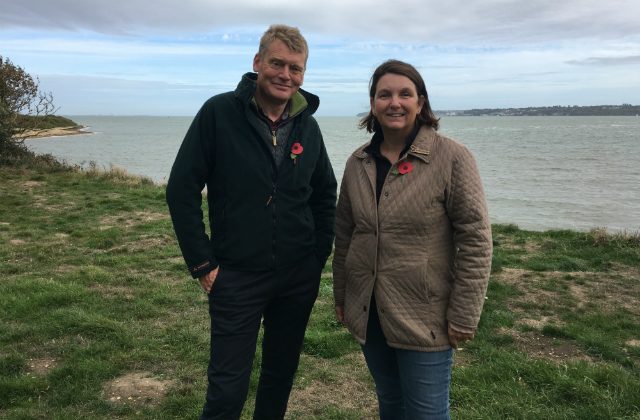Countryfile investigates the threats to our oak trees
BBC Countryfile reported on tree health and biosecurity this weekend, with Tom Heap investigating the threats to our iconic oak trees, such as the pest Oak Processionary Moth (OPM).
You can watch the piece on BBC iPlayer here.
Tom interviewed various tree experts such as Professor Nicola Spence, Defra Chief Plant Health Officer; Andrew Hoppit, OPM Project Manager and Tony Kirkham, Head of the Arboretum at Kew Gardens.
The first half of the package focuses on the efforts to control pests and diseases such as OPM. The OPM caterpillars feed on the tree’s leaves rendering it vulnerable to other pests and diseases, droughts and floods. The Forestry Commission, local authorities and land managers work together to tackle OPM with a comprehensive programme of control, surveillance, treatment and research.
The second half investigates what measures are being taken by the industry and the Government to protect our shores from the introduction of new pests.
The Government aims to stop pests and diseases before they arrive through actions like international surveillance, tight regulations on importing plants and plant products and routine inspections of consignments.
Furthermore, in May, the government launched the Tree Health Resilience Strategy which sets out to protect England’s tree population from pest diseases threat. This includes a commitment to consult with the sector to explore opportunities for quarantine for high risk species.
Part of the new Strategy was the launch of a major new partnership aimed at protecting the UK’s oak trees; Action Oak. The campaign aims to raise £15million for further research into the genetics and metabolism of oak trees and the effects of climate change, pests and diseases on these iconic trees.
The Guardian on Defra Brexit readiness
The Guardian has today published a piece focusing Defra Group preparations for Brexit. This comes after an EA memo calling on EA managers to provide details of staff who could be made available to transfer to Defra to support contingency planning for EU Exit.
Whilst we do not comment on leaked documents, press office shared a line and extensive briefing with the journalist Damian Carrington to make it clear that this work is part of ongoing cross-Government efforts to reprioritise resource to ensure a smooth Brexit, but that this does not come as a cost to our existing environmental priorities. While our line is carried, the piece focuses on stakeholder reaction.
Across Government we are working hard to carry out extensive preparations ahead of the UK’s departure from the European Union as is the duty of a responsible Government to prepare for a range of potential outcomes including the possibility of a ‘no deal’. Staff secondments are common in the public sector, especially within the Defra group, and do not impact the Environment Agency’s (EA) ability to manage incidents, including flooding.
The call for secondments equates to less than 1% of the EA’s staff. All incident and business-critical roles are protected. As leading experts in environmental regulation it is right that the EA work with Defra colleagues to shape our environmental future outside the EU.
We provided the following statement and briefing making these points.
A Defra Group spokesperson said:
Over 80% of Defra’s agenda is affected by Brexit and as a result a number of staff from across the Defra group are now supporting our comprehensive programme of work.
However, we are clear this must not impact our commitment to protecting our environment and the vital work of the Environment Agency in areas such as flood protection or tackling waste crime.
Background
- We do not comment on leaked documents.
- Statistics on the number of Defra Group staff seconded to Core Defra are not routinely published.
- Across Government we are working hard to carry out extensive preparations ahead of the UK’s departure from the European Union as is the duty of a responsible Government to prepare for a range of potential outcomes including the possibility of a ‘no deal’.
- As of the end of September, Defra group has recruited over 2,000 staff including fixed term appointments, interims and staff redeployed from elsewhere in the group. Over 1,800 are already in post with the remainder working though pre-employment processes.
- Staff secondments are common in the public sector, especially within the Defra group, and do not impact the Environment Agency’s (EA) ability to manage incidents, including flooding.
- The call for secondments equates to less than 1% of the EA’s staff. All incident and business-critical roles are protected.
- As leading experts in environmental regulation it is right that the EA work with Defra colleagues to shape our environmental future outside the EU.
- In the event of an incident, any EA staff on secondment to Defra for EU Exit posts would go back to the Environment Agency.